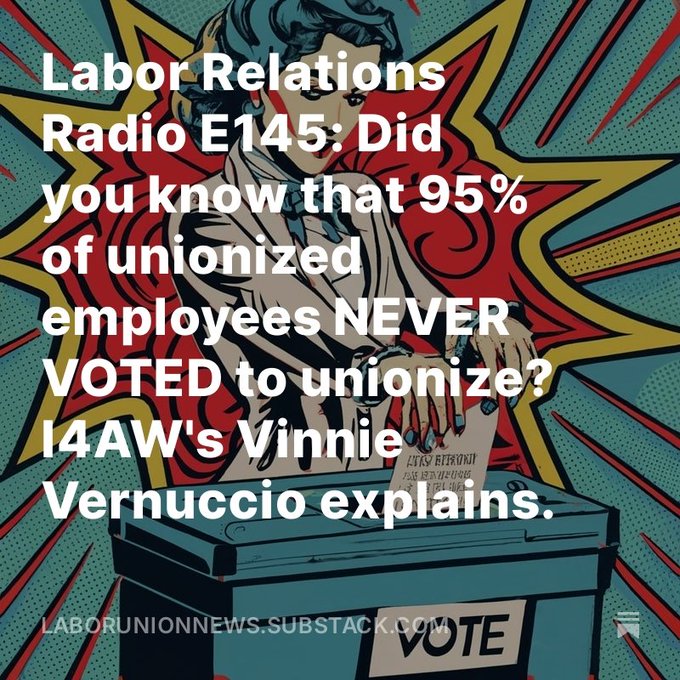Posts tagged public sector unions

Labor Relations Radio E145: Did you know that 95% of unionized employees NEVER VOTED to unionize? I4AW’s Vinnie Vernuccio explains.
September 4, 2024 // As Americans, every two, four, or six years, we head to polls to cast our ballots for who we want to represent us. For unionized workers in the private sector, the vast majority never voted to unionize. According to a new study [in PDF] by the Institute for the American Worker (I4AW), 95 percent of private sector union workers under the National Labor Relations Act (NLRA) are represented by a union they have never voted for.
Op-Ed: Public Sector Unions Should Only Speak for Their Members
September 3, 2024 //
Walz will address union members in first solo campaign stop
August 13, 2024 // As Minnesota governor, Walz signed a variety of pro-worker laws supported by labor — most significantly paid sick leave and paid family and medical leave. He also supported laws that banned noncompete agreements, prohibited employers from holding mandatory meetings intended to persuade workers against unionizing, raised safety standards in warehouses and meatpacking plants, and expanded unemployment benefits to hourly school employees who do not work during the summer.

AZ Supreme Court Strikes Down Union ‘Release Time’ on Taxpayers’ Dime
July 31, 2024 // In this case, the city signed a Memorandum of Understanding, or MOU, with a local unit of the American Federation of State, County, and Municipal Employees union. Under that MOU, the city gave the union several release time benefits, including four full-time release positions. In other words, the city paid four employees to work exclusively for the union on the taxpayers’ dime. The MOU said the cost of release time counted as part of the “total compensation” paid to all unit employees, whether members of the labor union or not. But that raised a problem: if release time was being paid as part of their “total compensation,” then it violates the free expression and association rights of these employees to force them to give up their compensation to fund the political speech of union representatives with whom these employees disagree. That was just what the U.S. Supreme Court said in the 2018 landmark Janus ruling.
Unpacking Kamala Harris’ record on federal workforce issues
July 26, 2024 // As vice president, Harris led a White House task force that made recommendations for how agencies could reduce barriers for public and private sector workers to organize or join a union. In the year after agencies began implementing these recommendations, the number of federal employees who are dues paying members of a union increased by 20%. “We are fighting to protect the sacred right to organize. We are protecting the sacred right to organize because we know when unions are strong, America is strong,” Harris said at a Service Employees International Union convention in May.
Labor groups begin to unite behind Harris’ campaign — but some holdouts remain
July 24, 2024 // Yet some notable union holdouts remain, suggesting Harris will still have some work to do to win over other working-class voters. On Monday, the American Federation of Labor and Congress of Industrial Organizations (AFL-CIO), the biggest federation of unions in the U.S. and a longtime supporter of President Joe Biden, announced its endorsement of Harris.

OPINION: Republicans Don’t Need to Embrace Union Leaders to Win Union Workers
July 1, 2024 // Republicans should appeal directly to union members with commonsense policies. Working-class Americans are among the hardest hit by Bidenomics and its painful inflation. Republicans should reach them with policies that will reduce the cost of living and increase job opportunities. The GOP should simultaneously and forcefully oppose the union-backed demands with a message of spending restraint. Additionally, the GOP should extend the 2017 tax cuts, which are set to expire at the end of 2025 — spurring a new era of job creation and wage growth.
No, Unions Aren’t Having a Resurgence—and That’s Good for Workers
May 9, 2024 // Introducing more competition to the private sector union business model could help. For that, my colleague Liya Palagashvili suggests ending the exclusive-representation clause that "provides government-granted monopoly status to a union supported by 51 percent of an employer's workers, giving it the sole authority to negotiate. This means that if some workers want a different union—for example a newer one that might raise the bar in terms of what it can offer—they are out of luck." Today, these workers aren't allowed to engage in any negotiations with their employers, and they still have to pay the original union's fees.

California legislators seek corruption law exemptions for unions, developers
May 7, 2024 // In California, the three largest donor types by sector are organized labor, including public sector unions representing state and local government employees, real estate, including developers seeking permits or regulatory changes, and healthcare, which includes healthcare providers and healthcare worker unions with lucrative government contracts. By exempting unions and most real estate, the new bill would allow unions representing government employees or workers with government contracts to donate to candidates who will support paying them more, and developers to more transparently donate to politicians who will approve their projects; while businesses and unions typically oppose each other on legislation, their shared interest in maintaining political access have created an unusual alliance.
OHIO: STATE SEES 68 PERCENT BUMP IN OPT-OUTS
April 29, 2024 // The spike in opt-outs in March was led by Ohio Association of Public School Employees, Ohio Civil Service Employees Association and American Federation of State, County, and Municipal Employees Council 8 members. All three of these unions saw more than 20 members choose to halt their dues deductions. The bump from 2023 was due entirely to the hard work of the Ohio’s outreach team, which sent out thousands of pieces of mail and emails to union members’ homes and inboxes.
